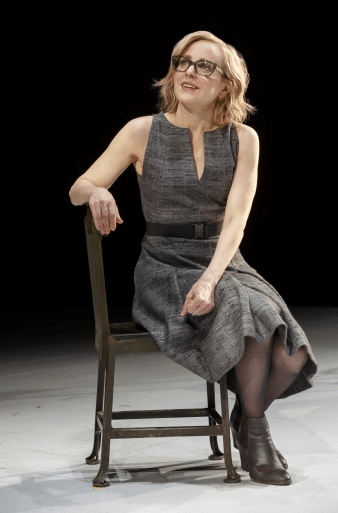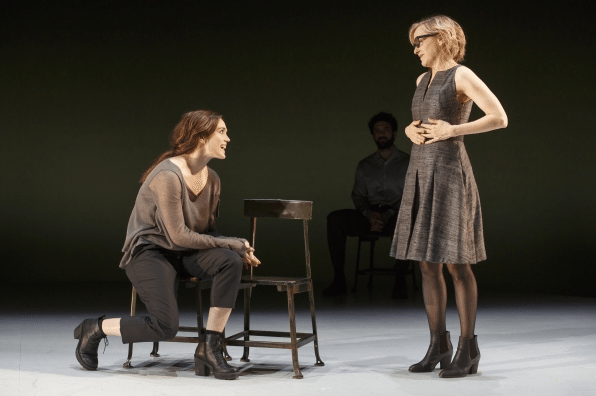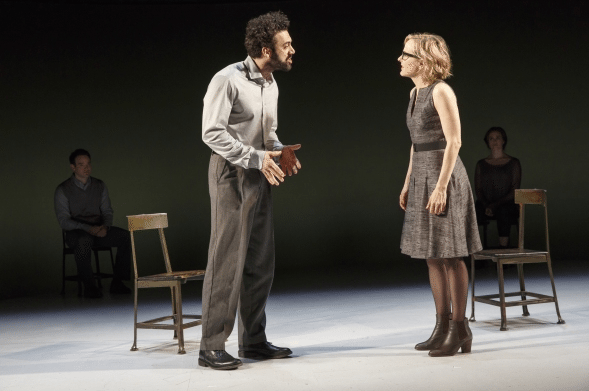

Whether she’s playing one character or four, Geneva Carr always brings a sense of in-the-moment earthiness to the stage. She broke through in Robert Askins’ Hand to God, for which she was rightfully nominated for the Best Actress Tony, as the tormented mother of a teenager with a “puppet problem”, but it’s in Nick Payne’s Incognito (at City Center through July 10, 2016) where she’s getting to show why she will be remembered for years to come. Playing a myriad of characters - a divorced mother coming to terms with her newfound discovery of love with another woman, a murder victim, a desperate wife - she gives the impression of both having researched these people tirelessly and also “creating” them on the spot. But she will be the first to dismiss any highfalutin talk of “craft”, at a talkback after a Saturday matinee she explained “I didn’t go to fancy acting schools” while proceeding to describe her process in a way that would have made Lee Strasberg salivate.
In a play that asks so much from the audience, Ms. Carr is the perfect guide, she tenderly takes us on a journey that she knows we won’t leave unscathed. It’s a testament to how wonderful her work is, that we feel both protected and protective of her characters. I spoke to her about finding her way inside the Payne-ian labyrinth, her unique methods of learning, and what she will be up to in our television screens.
Nick Payne has no regards for whether people understand his plays or not, and I think that is awesome. This forces the audience to be active, rather than having us just sit there and be “entertained”. Is he equally cryptic with the actors?
It’s so interesting that you say that, and the way you phrase it is exactly how I feel. When you do a Nick Payne play, you ask the people in the audience to take part, and I find that the people who have the best experience are those who let go. It’s like dancing, if you let it wash over you it makes sense. You have to work in a way, but you also have to let go. Nick is English, and the English are terribly polite, so I was surprised with Nick’s wicked little sense of humor, he’s very quick witted and easygoing. It takes him a while to open up, but I think he also put a lot of trust in [director] Doug Hughes who flew with his material. Doug has such incredibly specific ideas but when you’re rehearsing it’s never a done deal. If you have something you want to fight for, then you can fight for it. It’s rare for a director to be so open minded during that process.
You bring this element of sexiness to your characters…
Good! (Laughs)
...Exactly! But this is something that is often denied to characters over 25. Is this something you consciously bring to the parts?
I totally agree. I’ve been really lucky because my career started after 40. I thought it was just Rob Askins who thought past 40 a woman was still sexy and a sexual person. In a way Nick Payne is the same, Martha, the character in the play is a lily, which is a late in life lesbian, and I know lilies, one of my friend is one and she said “when you grow up in a right handed world and they put a pencil in your right hand and you write with it and you learn to create, and then one day someone puts a pencil in your left hand and it’s like you’ve suddenly been awoken”. So now she’s headed into the second part of her life as a lesbian. I think that Martha is kind of a lost person, but I love that her sexuality is a part of how she’s trying to figure herself out. There are a lot of roles like that, but women are so afraid to age in this business, but we’re still out there trying to get a guy, or a girl, trying to turn someone on. It’s part of life, just because you’re over 30 doesn’t mean it’s over.
Thank god for that!
Thank God! (Laughs)

Nick’s plays feel like they’re written by a scientist trying to make sense of the world through theatre. You were a banker and you quit to become an actor, and hooray for that. But I’m curious, what kind of insight do you discover when filtering dramatic works through the lens of someone with a completely different career?
I think that my approach is definitely from a different place because I didn’t go to drama school, so I don’t approach material in the same kind of way. I’m more methodical about how I break down a script and a character. I definitely think that’s how my training helped me, I think any education is good, if you exercise your brain and try to understand what’s in front of you, that’s what you’re going to use. I think the stuff about Nick’s writing that’s so exciting to me, is that even though it’s couched in a very cerebral conversation about the brain and its functions, in this particular play, it’s really a visceral work. We can try to figure out how Henry learns things, why he can remember playing the piano, but can’t remember his conversation with someone, but it’s also about how love exists. Once he knows love he deciphers that time has passed and that his love never died, and that’s what lifts the play beyond an intellectual argument. As much as his writing is scientific, it’s almost spiritual because it’s the feelings that take us over. Martha feels she can’t help her patients, that the brain is everything and we are nothing, this is a woman who has just reawakened her romantic feelings and is trying to find her place in the world. So he has an argument that’s contrary to itself and that’s what’s so exciting.
Henry’s story speaks about that connection that goes beyond what we can comprehend that ties us to people we love, and it made me think of something I read in one of your interviews in which you said you realized after your mother had passed, that she had once wanted to be an actress. I wondered if you had been inspired by that to do the play?
I can’t believe you remember that. That’s exactly what I thought. My mother had passed and at her funeral someone said “oh god, she always wanted to be an actress, we called her ‘Drama Queen’”. I do think there are inexplicable genetic traits that we carry, which to me is so interesting. There are things we can not explain and I think Nick obviously believes that too, because even though he’s trying to find the answers in his writing through logic and science, there is something beyond that is true. That’s why I think his work is never cold or distant, because it’s about who we are. We are brain functions and things we can break down and understand, but why is it that Henry all those years later loves his wife? Feelings don’t fade and we inherit something. That’s why at the end of the play I get so emotional, I draw from my own experience. I wish my mother could see this, I wish it all the time.
You mentioned the “Lind Technique” at a talkback after the show, can you explain that?
Doug was joking because we were trying to put the scenes together in rehearsal. We had rehearsed them individually and Doug had us do one scene after the other to get the flow of the play. I would be incapable of doing my scenes now without watching all the others in preparation, because I’m fully engaged in the other scenes, even though I’m onstage. Each scene feeds the next and one day Heather said “you move so quickly between scenes that when you finish one, your body or your voice are already leaning into the next scene”. In one scene I do with her, she says something to me but her body has become somebody else. So you’re touching on the next scene. Heather was talking about that once and Doug teased her by calling it the “Lind Technique”, so it became a running joke for us in how we approach each scene. If you fly, the faster you go, the faster the audience goes with you.
You studied with Jane Hoffman, and when I’ve heard you explain acting you make it sound so clear, so have you thought about teaching the Geneva Technique?
You’re funny, I actually have thought about it. I would call it the “Jane Hoffman Technique” though, I took a beginner’s class but the instructor told me I should be learning with Jane Hoffman who taught professionals. I thought it sounded terrifying, but I took the class and in the beginning I could cry on cue, do accents...I thought I was getting it. But one time I was doing a monologue from Getting Out by Marsha Norman, which is one of my favorite plays, it’s about a woman who’s had a pretty rough time trying to make it within the system. I thought I was doing it right but Jane kept saying I wasn’t in the moment. I didn’t know what the hell she was talking about. So as I was doing the monologue she snuck behind me and smacked me in the head, I was so shocked, my feelings were so hurt and I felt like I was gonna cry. She said “do the monologue, just do it!”, so I did it and held it together with everything that was going on inside me. That was my Helen Keller moment and I told my story to Jane, when Annie Sullivan was showing Helen water she’d been doing the signs for months, but when Helen understood the water in her hands was that sign, I felt with Jane that was it. Being in the moment meant that everything you feel and are, you rehearse it like crazy, but if you let it live in the moment then it’s real. That’s why you see a play ten times and even if they’re standing there doing the same thing, it’s different every single time. In Incognito I watch those guys every night and I know every single nuance, they are so generous. I pick an actor to watch every show, last night it was Morgan and he was so playful. Before shows open we’re all terrified of reviews, but once they’re open we can just play. This is a very playful play and these actors are fabulous. In another play I did with Jane I was supposed to start by laughing hysterically, I asked her how to do that, she said “laugh! Laugh!”, it wasn’t brain surgery, it was just laughter. I think of her often, she was tough, she said “one day you’re not going to have a great director, so just do it!”

Since you mentioned watching actors, Robert Askins wrote Hand to God for you. Do you feel possessive of Margery or is it refreshing to see what someone new brings to the part?
Honestly I can’t wait to see someone do it. I did that play 500 performances probably and I would love to see someone do it. Unfortunately I wasn’t able to go to London, but I’m gonna go somewhere and see somebody do it. I created that part with an amazing writer and director, who are wonderful and talented. I’m really curious to see what someone else does with just what’s on the page. I know that other people might think it would be hard, but I have to tell you I think about that play often. I was meditating today and sometimes your mind wanders, and my mind wandered to the first scene of Act II, my head was still there. I will think about that play forever, I think I will do it again. I don’t think it’s over for me. Margery will age, she has a teenage son, she could be 30 or 50!
You’ve mentioned that you don’t dance or know how to sing, but secretly would you like to do a musical?
It’s my biggest fantasy. I’d love to do a musical. It would terrify me, but I would love to do it Marc Kudisch always says he’ll teach me how to sing (laughs).
I was watching “I Heart NY” from Sex and the City the other day, which I’ve seen a million times, and for the first time I noticed you were in it!
I helped deliver the baby! (Laughs) I loved that show, they employed a lot of actors. I have a new show [Bull] coming out on CBS. It’s about jury consultants so I keep thinking we’re going to employ a millionactors, because we have a jury and a mock jury, so that’s 24 people guesting on the show every week.
It is a drama or a comedy?
It’s a drama with a sense of humor. I had my working session with the writers where they ask you about special skills, and things you’re desperate to do. I told them Marlee Matlin is my dream to work with, I sign a teeny bit, so I wanna sign with her. They promised a sense of humor because the show stars Michael Weatherly and he’s got a sense of humor. He’s incredible, he started in theatre so he has a great work ethic. Chris Jackson from Hamilton is also in it, and Freddy Rodriguez from Six Feet Under too, he’s so amazing. He’s lovely, kind and also devastatingly handsome, I just have to say it.
He is! Maybe you’ll get to sing on that show…
Oh my God, that would be hysterical! You might have just made that happen.
Incognito is playing at City Center through July 10. For tickets and more click here.